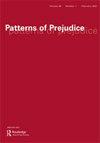The elephant in the room called ‘skin type IV’: ‘Südländer’ (Southerner) as a discriminatory category in German police reports
IF 0.8
2区 社会学
Q4 ETHNIC STUDIES
引用次数: 0
Abstract
ABSTRACT Ervedosa’s article demonstrates from a cultural perspective that the categories ‘Südländer’ (Southerner) and ‘südländisches Aussehen’ (Southern looks) in German police reports are discriminatory since they challenge the central principles of the German constitution. They infringe the fundamental right in Article 3.3, that is, the right not to be racially discriminated against, the fundamental rights of human dignity (Article 1.1) and human equality (Article 3.1), as well as the constitutional right to be a German citizen regardless of one’s skin colour (Article 116). It argues that the terms are a form of skin-colour racism in that the police carry out their work—investigations, searches, inquiries and so on—on the basis of the perpetrator’s racialized phenotype. The categories basically stand for ‘Mediterranean looks’—even referred to in the past as the ‘Mediterranean race’—and phenotype: dark hair, dark eyes and so-called ‘skin type IV’, that is, ‘olive or brown skin’. They are the product of a tradition of racialized, exclusionary thinking that collides with the humanistic and democratic values of the Grundgesetz (Basic Law).房间里的大象称“皮肤类型IV”:“Südländer”(南方人)是德国警方报告中的歧视类别
Ervedosa的文章从文化角度论证了德国警方报告中的“Südländer”(南方人)和“südländisches Aussehen”(南方人)这两个类别具有歧视性,因为它们挑战了德国宪法的核心原则。它们侵犯了第3.3条的基本权利,即不受种族歧视的权利、人的尊严的基本权利(第1.1条)和人的平等的基本权利(第3.1条),以及不论肤色都是德国公民的宪法权利(第116条)。它认为,这些术语是肤色种族主义的一种形式,因为警察根据犯罪者的种族化表型进行工作——调查、搜查、询问等等。这些分类基本上代表了“地中海长相”——甚至在过去被称为“地中海种族”——和表现型:深色头发、深色眼睛和所谓的“第四种肤色”,即“橄榄色或棕色皮肤”。它们是种族化、排他性思维传统的产物,与《基本法》(Grundgesetz)的人文和民主价值观相冲突。
本文章由计算机程序翻译,如有差异,请以英文原文为准。
求助全文
约1分钟内获得全文
求助全文
来源期刊

Patterns of Prejudice
Multiple-
CiteScore
2.50
自引率
0.00%
发文量
11
期刊介绍:
Patterns of Prejudice provides a forum for exploring the historical roots and contemporary varieties of social exclusion and the demonization or stigmatisation of the Other. It probes the language and construction of "race", nation, colour, and ethnicity, as well as the linkages between these categories. It encourages discussion of issues at the top of the public policy agenda, such as asylum, immigration, hate crimes and citizenship. As none of these issues are confined to any one region, Patterns of Prejudice maintains a global optic, at the same time as scrutinizing intensely the history and development of intolerance and chauvinism in the United States and Europe, both East and West.
 求助内容:
求助内容: 应助结果提醒方式:
应助结果提醒方式:


